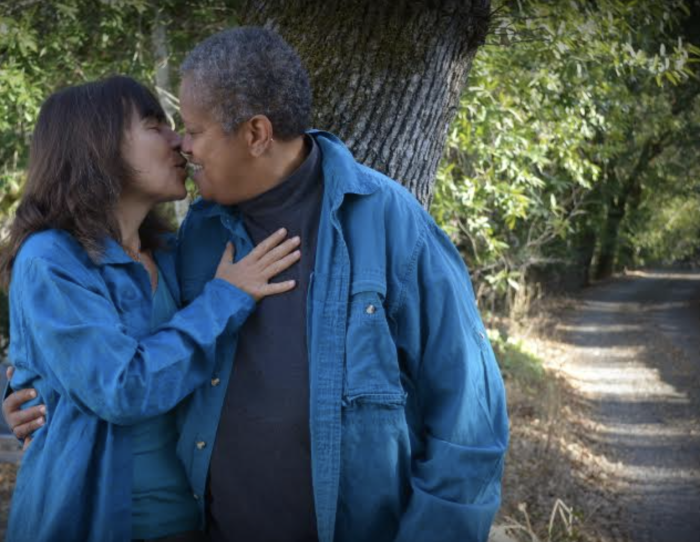When Michelle and I were partners and traveled together, I was incredibly fond of an old carry-on suitcase with wheels.
It fit better in the overhead bin on planes than any other carry-on, and it had gone all the way to India and back with me. Sadly, it was torn. But I proudly repaired it with dental floss.
Michelle wasn’t comfortable with that bag of mine. “I don’t want to be seen with you,” she joked. I thought that was silly. “What’s the big deal? I’m the one with the torn bag, not you!”
This seems like a simple little story on the surface: just two partners with different priorities and perspectives. But, let me offer you a few insights that deepen and complicate the conflict.
Michelle was Black and I am white, but she grew up with a lot more money than I did. Both of us had fathers with advanced degrees, but hers was much older than mine was when I was born, so he’d had more time to make money. He also valued money and success more than my dad did.
Of course, being white, my dad didn’t have to value money or appearances in the same way hers did. He was free to buy a house in any neighborhood he could afford, whereas her dad could only buy in the single “nice” neighborhood outside New York City that allowed Black buyers in the 1960s.
On the other hand, my dad had been subjected to discrimination too, albeit of a milder kind. When he went to college, he wanted to join a fraternity, but they didn’t allow Jews.
Speaking of Jews, the one upper-middle-class suburb that allowed Black buyers in the 1960s, where Michelle grew up, was a Jewish neighborhood. We often joked that that made her more Jewish than I was, because although I had the bloodline, she knew way more about the culture and religion.
So, back to the suitcase. Yes, I am Jewish, and Jews are known for being frugal/thrifty/stingy—which adjective you choose is really in the eye of the beholder. We can be praised for this trait, or we can be hated.
Some people assume that this relationship to frugality is because Jews are so attached to money. Yet others understand that this quality may come from the fact that Jews were historically expelled from country after country, relentlessly displaced, so we had to learn to make do.
So here we have a white Jewish woman extending the life of an old suitcase with a dental floss sewing job. And, though unconsciously, this habit probably emerged from oppression.
And, we have a Black woman in a culture completely stacked against her, whose family had still found a way to acquire money and power. And, the need to acquire money and power, at least in this case, emerged from oppression, too.
As it happens, both Michelle and I grew up with many kinds of ease. Both our families assumed we would go to good colleges. Both of our fathers paid for us to go to college.
But if you are white or Black or any other color and grew up without privilege, your story belongs here, too. All of our stories have shaped us. Our survival is an art. We’ve just had different materials to work with.
No one is wrong in this story. Neither of us is right. And whatever you think about the suitcase, you’re not wrong or right either. But…
When we talked further, Michelle realized, and shared with me, that the reason why she felt so self-conscious about being seen with me, with my dental-floss-repaired suitcase, was because, as a Black person, she needed to look affluent in order not to be treated like sh*t.
Her privilege, her “good college,” the fact that her father was on the very small A-List of Important Black Men in New York City, didn’t protect her from judgment or even danger, if she didn’t look the part.
In that moment, I got it. I had thought she was being elitist in caring about what my suitcase looked like. And I had thought her self-consciousness was silly, since after all, the suitcase was mine, not hers.
But in that moment, my understanding completely changed. I realized that while I had the privilege to walk around as a white person and still be treated well even with a shabby suitcase, Michelle didn’t.
Of course her parents had focused on having nice things, and taught her to care about how she looked! It was a means of survival. My white parents could go around looking like hippies, because people were going to treat them well anyway.
The funny thing is, in most ways Michelle rebelled against her parents’ focus on nice things because they wanted her to have a fancy house, and she never cared about that. They wanted her to look feminine, and that was never who she was.
So you see, the picture is complicated again. But in this one way, Michelle had learned the importance of looking “respectable” in the world, and felt self-conscious and unsafe at the thought of compromising that—even if the shabby carry-on belonged to her white partner, not her. But on the other hand, she had found ways to honor herself and her true values in most parts of her life. Talk about a balancing act!
Can we add more complexity yet? Can we add in the fact that, in addition to being Black, Michelle had a big, somewhat awkward body, and walked with a limp? A body considered “overweight” by BMI standards based on white, not African-descended bodies? She had a body that made her even more self-conscious moving through the world, while my body is small and lithe and not usually subject to such harsh judgment.
I didn’t do anything to make my body this way, nor did she. These are just the shapes we were born with.
Can we also add in that Michelle was always gender-nonconforming and wore mens’ clothes, which didn’t fit well on her femininely shaped body, in which she didn’t feel at home? And the fact that I am cisgendered, i.e. feel at home in women’s clothes and presenting as female?
Does it make sense that given all of these factors, Michelle would care about the kind of suitcase I was pulling because she just didn’t want people looking at her any more than they already were, with any more judgment or negative assumptions than they already had?
It made a lot of sense to me, once I got it.
This story isn’t black and white. In fact, to add even more complexity…
Michelle tended to feel especially judged by Black people for the way she dressed, and how she presented her gender. She often felt more at home with white people than with Black people in that way. And as a kid, she’d been beaten up by poorer Black kids, because she came from money. That trauma lived in her body, too, so on a visceral level she felt safer sometimes with white people.
As a Black adult who meditated, ate organic food, and loved being out in nature, Michelle was often “the only one.” When she was with white people, she didn’t quite fit in, but when she was with Black people, she didn’t fit in either.
Hopefully you’re not bored here! To me, all of this is interesting because I love complexity. I love the fact that how things first appear is often not how they actually are, and the fact that almost always, many things are true at once.
And here’s the love story part. Although I am far from a perfect person, I was able to understand that for many reasons not of her own choosing, Michelle had a harder time feeling at home in the world than I did. That was just true.
Because I loved her, I cared about that fact. I didn’t need us to “compromise” around the suitcase issue. I only needed to realize that Michelle actually had a much stronger need and more vulnerability than I did in the situation.
Once I realized that, I had no desire to bring that carry-on with me when we traveled. Michelle’s sense of well-being was much more important to me.
This wasn’t a “sacrifice,” and wasn’t something I would tally on a list to make sure she paid me back in some way. It was a gift I wanted to give to her: the gift of accommodating her need in a place where I easily could.
To me, that’s what love is—understanding where someone else is coming from, seeing the complexity of the situation, genuinely wanting to care for each other, and then finding a way forward.
If the suitcase had had enormous emotional import for me—say, if it had been a hand-me-down from my favorite relative or I harbored a deep belief that taking it on trips would keep me safe—then maybe our way forward would have been different. But as it was, it was a no-brainer. I got myself a nicer suitcase, Michelle felt more comfortable, and most importantly, we learned important things about ourselves and each other, so that we could feel closer.
Did you get surprised by this story in any way? Did you learn anything? Did you relate to Michelle, me, or both of us in some way? Is there anything it can help you better understand about your own life, or someone else’s life? Please write and let me know.
By the way, Michelle and I are no longer together, and actually, Michelle gender-transitioned and is now a man named Max, but the photo shows us as we were at the time of this story. Max and I are good friends, and I continue to run the Conscious Girlfriend Academy, the “child” we had together in 2014. It’s now an international online school supporting lesbians, queer women, and adjacent non-binary people with conscious dating and love.
~
Please consider Boosting our authors’ articles in their first week to help them win Elephant’s Ecosystem so they can get paid and write more.
~
 Share on bsky
Share on bsky




Read 3 comments and reply